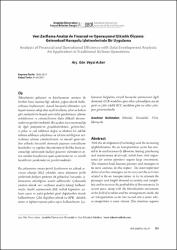Veri zarflama analizi ile finansal ve operasyonel etkinlik ölçümü: Geleneksel havayolu işletmelerinde bir uygulama

View/
Access
info:eu-repo/semantics/openAccessDate
2018Author
Anadolu Üniversitesi
Veysi, Asker
Metadata
Show full item recordCitation
Asker, V. (2018). Veri zarflama analizi ile finansal ve operasyonel etkinlik ölçümü: Geleneksel havayolu işletmelerinde bir uygulama. Anadolu Üniversitesi Sosyal Bilimler Dergisi, 18 (1), 153-172.Abstract
Teknolojinin gelişmesi ve küreleşmenin artması ile
birlikte hava taşımacılığı sektörü yoğun olarak kullanılmaya başlanmıştır. Ancak havayolu işletmeleri için
hayati öneme sahip olan uçak kiralama, alım ve bakım
gibi maliyetlerin büyük yatırımlar gerektirmesi işletme
ortaklarının ve yöneticilerinin daha dikkatli davranmalarını gerektirmektedir. Bu açıdan hava taşımacılığı
ile ilgili faaliyetlerin gerçekleştirilmesi, geliştirilmesi yolcu ve yük talebinin doğru ve eksiksiz bir şekilde
tahmin edilmeye çalışılması ve işletme kârlılığının arttırılması işletme yöneticilerinin en önemli görevidir.
Son yıllarda havacılık alanında yaşanan serbestleşme
hareketleri ve yapılan düzenlemelerle birlikte hava taşımacılığı sektöründe faaliyet gösteren işletmelerin artan rekabet koşullarına ayak uydurmalarını ve sürekli
kendilerini yenilemelerini gerektirmektedir.
Bu çalışmanın amacı petrol fiyatlarının en yüksek seviyeye ulaştığı 2012 yılından sonra dünyanın farklı
yerlerinde faaliyet gösteren 16 geleneksel havayolu işletmesinin etkinliğinin analiz edilmesidir. Çalışmada
yöntem olarak veri zarflama analizi tekniği kullanılmıştır. Analiz aşamasında ASK, koltuk kapasitesi, çalışan sayısı ve yakıt giderleri girdi değişkenleri olarak
kullanılmıştır. Çıktı değişkeni olarak ise RPK, doluluk
oranı ve toplam taşınan yolcu sayısı kullanılmıştır. Çalışmanın bulguları, birçok havayolu işletmesinin ilgili
dönemde CCR modeline göre etkin çıkmadığını ancak
girdi ve çıktı odaklı BCC modeline göre ise etkin çıktığını göstermektedir. With the development of technology and the increasing
of globalization, the air transportation sector has started to be used extensively. However, leasing, purchasing
and maintenance of aircraft, which have vital importance for airline operators require large investments.
This situation leads business partners and managers to
be more cautious. In this respect, The most important
duties of airline managers are to carry out the activities
related to the air transportation, to try to estimate the
passenger and freight demand accurately and completely and to increase the profitability of the enterprise. In
recent years, along with the liberalization movements
in the field of aviation and the arrangements made, the
air transportation sector has turned into a sector where competition is more intense. This situation requires companies operating in the air transport sector to keep
up with the increasingly competitive conditions and
constantly renew themselves.
The aim of this study is to analyze the effectiveness of
16 traditional airline operations operating in different
parts of the world since 2012 when oil prices reached
the highest level. Data envelopment analysis technique
was used as a method in the study. Input variables such
as ASK (Available Seat Kilometer), seat capacity, number of employees and fuel consumption are used during
the analysis phase. Output variables are RPK (Revenue
Passenger Kilometer), Load Factor and total number of
passengers. Findings of the study show that most airline
operations are not active according to the CCR model
in the period concerned but active output according to
the input and output-oriented BCC model.
Source
Anadolu Üniversitesi Sosyal Bilimler DergisiVolume
18Issue
1Collections
- Cilt.18 Sayı.1 [13]

















